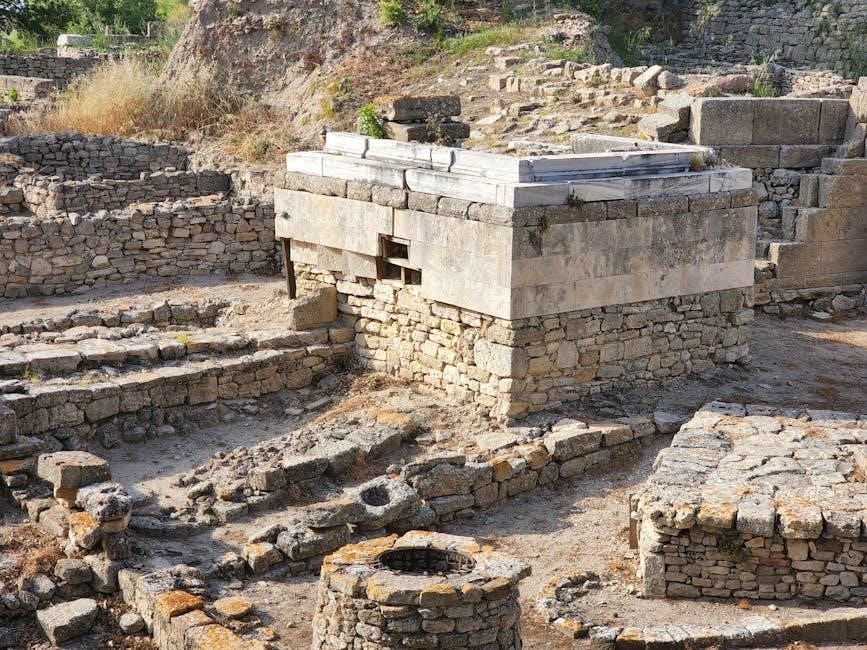The Iliad by Robert Fagles PDF: A Comprehensive Guide
The Iliad, a timeless epic, finds new life in Robert Fagles’ translation. This guide explores Fagles’ work, offering insights into its features, availability in PDF, critical reception, and lasting impact.
Overview of Robert Fagles’ Translation
Robert Fagles’ translation of The Iliad stands as a celebrated modern rendition of Homer’s epic poem. Published in 1990, it offers a contemporary voice to the ancient text, making it accessible to a wider audience. Fagles, a renowned poet and scholar, masterfully balances poetic artistry with scholarly accuracy, capturing the raw power and emotional depth of the original Greek. His translation is characterized by its dynamic language, vivid imagery, and compelling narrative flow, drawing readers into the heart of the Trojan War. Fagles’ work includes an insightful introduction by Bernard Knox, enhancing the reader’s understanding of the poem’s context and themes. This translation has garnered widespread acclaim for its ability to bring The Iliad to life for a new generation of readers. This version is widely liked and used in many academic settings.

About the Translator
Understanding Robert Fagles’ background enriches appreciation for his Iliad translation. His expertise as both a poet and scholar shaped his approach to rendering Homer’s epic.
Robert Fagles: Biographical Information
Robert Fagles (1933-2008) was a celebrated American professor, poet, and translator, renowned for bringing classical Greek epics to modern audiences. He taught English and comparative literature at Princeton University for many years, earning accolades for his engaging teaching style. Fagles’ translations, including the Iliad, the Odyssey, and the Aeneid, are praised for their accessibility, poetic rhythm, and dramatic flair.
He received the PEN/Ralph Manheim Medal for Translation, recognizing his significant contribution to literature. Fagles’ work aimed to make the classics relevant and engaging for contemporary readers, ensuring their enduring appeal. His ability to balance scholarly accuracy with poetic expression made him a leading translator of his time, leaving a lasting legacy in classical literature.
Key Features of Fagles’ Translation
Robert Fagles’ translation of the Iliad is known for its modern language, poetic style, and accuracy. Bernard Knox’s introduction and notes further enrich the reading experience.
Modern Language and Accessibility
Robert Fagles’ translation of The Iliad distinguishes itself through its use of modern language, making it accessible to contemporary readers. Unlike earlier, more archaic translations, Fagles employs a vocabulary and sentence structure that resonate with today’s audience, bridging the gap between ancient epic and modern understanding. This accessibility is crucial for engaging new readers with Homer’s timeless story of war, heroes, and the human condition.
By avoiding overly formal or stilted language, Fagles allows the power and emotion of the original Greek to shine through, unburdened by linguistic barriers. The result is a translation that feels both authentic to the source material and immediately understandable, inviting readers to fully immerse themselves in the world of The Iliad. This commitment to clarity and readability has made Fagles’ version a popular choice for students, general readers, and anyone seeking a fresh and engaging encounter with this classic work.
Poetic Style and Accuracy
Robert Fagles’ translation of The Iliad is celebrated for its blend of poetic style and accuracy, capturing the essence of Homer’s epic while remaining faithful to the original Greek. Fagles masterfully balances the demands of both art and scholarship, crafting a translation that is not only beautiful to read but also true to the meaning and spirit of the text. His poetic sensibility shines through in the rhythmic flow of the language and the vivid imagery he employs, bringing the world of The Iliad to life with remarkable power.
At the same time, Fagles maintains a rigorous commitment to accuracy, ensuring that his translation reflects the nuances and complexities of the original Greek. He achieves this delicate balance through meticulous research and a deep understanding of Homeric language and culture. The result is a translation that is both a work of art and a valuable resource for scholars and students alike.
The Robert Fagles translation of The Iliad is further enhanced by the insightful introduction and notes provided by the renowned classicist Bernard Knox. Knox’s introduction offers a comprehensive overview of the poem, exploring its historical context, major themes, and literary significance. He provides valuable insights into Homer’s world, shedding light on the cultural and social values that shaped the epic.
Additionally, Knox’s notes offer detailed explanations of key passages, characters, and events, helping readers to navigate the complexities of The Iliad. He clarifies obscure references, provides historical background, and offers alternative interpretations, enriching the reader’s understanding of the poem. Together, Knox’s introduction and notes serve as an invaluable companion to Fagles’ translation, providing a deeper appreciation for the richness and complexity of Homer’s masterpiece, noting the violence and yearning for peace.

Availability of the PDF Version
Accessing Robert Fagles’ translation of The Iliad in PDF format offers convenience. However, it’s important to consider legality and copyright when seeking out digital versions of the text online.
Where to Find the PDF Online
Locating a PDF of Robert Fagles’ translation of The Iliad requires careful navigation of the digital landscape. While numerous websites may offer downloads, verifying their legitimacy is crucial. Reputable sources like university archives or established online bookstores sometimes provide access. Be cautious of unofficial sites promising free downloads, as they may infringe on copyright or contain malware.
Exploring online library catalogs or digital repositories dedicated to classic literature can also yield results. Project Gutenberg, for example, offers free ebooks of public domain works, though availability may vary. Always prioritize legal and ethical access when seeking electronic versions of copyrighted material. Check for options on Google Books also.
Legality and Copyright Considerations
Accessing a PDF of Robert Fagles’ translation of The Iliad necessitates a clear understanding of copyright law. Fagles’ translation is a copyrighted work, meaning unauthorized distribution is illegal. Downloading from unofficial sources infringes on the rights of the translator, publisher, and estate.
Legitimate avenues for accessing the PDF, like purchasing from authorized online retailers or borrowing through digital library services, ensure compliance with copyright regulations. Be wary of websites offering free downloads without proper licensing agreements, as they may expose users to legal risks. Always respect intellectual property and support the creators by obtaining the work through legal channels. Failure to adhere to copyright laws can result in penalties.
Critical Reception and Impact
Robert Fagles’ translation of The Iliad garnered widespread acclaim for its accessibility and poetic style; Scholars and critics lauded its modern language and engaging narrative, solidifying its place as a definitive version.
Reviews and Scholarly Analysis of Fagles’ Work
Critical reception of Robert Fagles’ translation of The Iliad has been overwhelmingly positive, with reviewers consistently praising its modern language and accessibility. Scholars have noted how Fagles manages to strike a balance between accuracy to the original Greek and a style that resonates with contemporary readers. His work is often lauded for making Homer’s epic poem engaging for new audiences while retaining the emotional depth and complexity of the original.
Analyses frequently highlight Fagles’ poetic choices, emphasizing his ability to capture the rhythm and intensity of Homer’s verse in English. The translation’s impact is evident in its widespread adoption in academic settings and its popularity among general readers, establishing it as a standard for modern translations of classical literature.

The Iliad: Themes and Context
The Iliad explores profound themes like war, honor, and fate, set against the backdrop of the Trojan War. Understanding this context enriches the reading experience of Fagles’ translation.
The Trojan War: Historical and Mythological Background
The Trojan War, a cornerstone of Greek mythology, blends historical speculation with fantastical elements. It’s believed to have occurred around the 13th century BCE, possibly triggered by conflict over trade routes or resources. Myth attributes the war to a series of events beginning with a beauty contest among goddesses, leading to Paris of Troy abducting Helen, the wife of Menelaus, king of Sparta. This act ignited a decade-long siege of Troy by the Achaean forces.
Homer’s Iliad focuses on a brief, yet pivotal, period during the war’s final year. The epic intertwines divine intervention with human actions, showcasing gods influencing battles and shaping destinies. The war serves as a stage for exploring themes of honor, heroism, and the tragic consequences of conflict, all vividly portrayed in Robert Fagles’ translation. Understanding this blended background is essential for appreciating the depth and complexity of the Iliad.
Major Themes in The Iliad
The Iliad, powerfully rendered by Robert Fagles, delves into profound themes that resonate across time. Central is the theme of wrath, particularly Achilles’ rage, which fuels much of the narrative’s conflict and tragedy. Honor and glory are paramount for the Achaean warriors, driving their actions and shaping their identities, often leading to destructive consequences. The poem explores the complex relationship between fate and free will, questioning the extent to which human actions are predetermined by the gods or driven by individual choices.
Mortality looms large, as characters grapple with their own vulnerability and the inevitability of death, even amidst heroic deeds. The devastating consequences of war are vividly portrayed, highlighting the suffering and loss experienced by both victors and vanquished. Through Fagles’ translation, these timeless themes are brought to life, offering a poignant reflection on the human condition and the enduring power of epic storytelling.

Legacy and Influence
The Iliad, especially through translations like Robert Fagles’, has profoundly shaped literature and art. Its themes and characters continue to inspire creators, ensuring its enduring legacy across cultures and generations.
The Iliad’s Impact on Literature and Art
The Iliad, in translations like Robert Fagles’, has exerted a monumental influence on Western literature and art. From ancient Greek dramatists to modern writers like T.S. Eliot, Homer’s epic has served as a wellspring of inspiration. Its themes of war, honor, and the human condition resonate across centuries, informing countless works of fiction, poetry, and drama.
Artists, too, have long been captivated by The Iliad’s vivid imagery and powerful narratives. Paintings, sculptures, and even contemporary media continue to draw upon the epic’s iconic scenes and characters, perpetuating its cultural significance. Fagles’ translation, with its accessible language and poetic style, has further broadened the epic’s reach, ensuring its continued relevance for new generations of artists and audiences. The work stands as a testament to literature’s enduring power.

